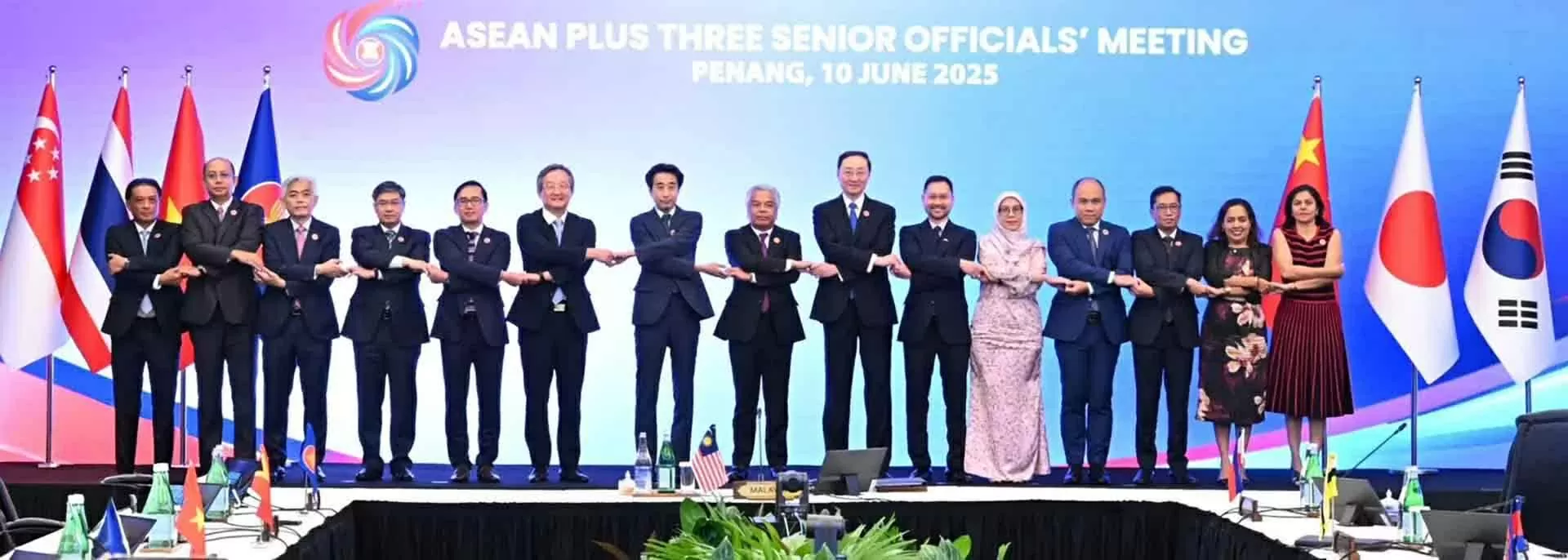
ASEAN and partners discuss orientations to enhance dialogue and cooperation
Latest
 |
| Delegates attending the Senior Officials Meeting within the framework of ASEAN, ASEAN+3, EAS and ARF. |
Authorized by the leaders of the Ministry of Foreign Affairs, Ambassador Tran Duc Binh, Director General of the ASEAN Department, led the Vietnamese delegation to attend the meetings.
The countries congratulated the Malaysian Chair on the success and important results achieved at the 46th ASEAN Summit and related Summits held last May in Kuala Lumpur, affirming ASEAN's central role in shaping cooperation in the region.
Appreciating the orientation of “self-reliance, dynamism, creativity and people-centeredness” of the ASEAN Community Vision 2045, the countries consider this as a guideline not only for ASEAN cooperation strategies and between ASEAN and its partners, opening up directions for intra-bloc cooperation and with partners.
ASEAN members have actively discussed preparations for the admission of Timor-Leste as the 11th member of ASEAN in October 2025, urgently completing the procedures to join the ASEAN Charter and building a roadmap to join other legal documents on the three pillars of politics-security, economy and culture-society, supporting Timor-Leste to effectively exploit the benefits from the integration process.
The ASEAN Secretariat report shows that cooperation in mechanisms continues to progress positively. Within the framework of ASEAN+3, more than 60% of the action lines in the Work Plan for the period 2023-2027 have been and are being implemented, ranging from trade, investment, small and medium enterprises, to tourism, and supply chain connectivity.
The EAS Action Plan for the period 2024-2028 has initially achieved remarkable results in areas such as climate, environment, energy, health, connectivity, and maritime.
The mechanisms under the ARF closely follow the proposed work plan, implementing many practical activities on maritime security, disaster management and mitigation, response to transnational crimes, counter-terrorism, etc.
Member countries particularly emphasized the importance of maintaining goodwill dialogue, narrowing differences and promoting commonalities, and strengthening strategic trust.
In the context of many changes in the region and the world, the countries affirmed the role of multilateral cooperation based on trust and mutual respect, committed to supporting ASEAN's central role, implementing specific and substantive cooperation programs, contributing to peace, stability and sustainable development.
The "inclusive" and "sustainable" orientations in the theme of Malaysia's ASEAN Chairmanship Year 2025 need to continue to be demonstrated throughout and be the driving force for cooperation processes in the region.
The meetings discussed frankly many international and regional issues such as the East Sea, Myanmar, the Korean Peninsula, the Middle East, the conflict in Ukraine, etc, emphasizing the settlement of disputes by peaceful means, in accordance with international law, including the 1982 United Nations Convention on the Law of the Sea (UNCLOS), supporting ASEAN's principled stance on the East Sea issue, supporting ASEAN's role, the efforts of the ASEAN Chair and the Special Envoy in implementing the Five-Point Consensus on Myanmar, promoting the effectiveness of consultation mechanisms, supporting Myanmar to overcome the crisis, and conducting relief activities after the severe consequences of the earthquake on March 28, 2025.
Emphasizing the importance of promoting cooperation to respond to non-traditional challenges such as climate change, cyber security, population aging and transnational crime; while exploiting emerging areas such as digital economy, green transformation, clean energy, food security, artificial intelligence and other emerging technologies, the countries agreed to promote cooperation frameworks such as the Digital Economy Framework Agreement, the ASEAN Power Grid, upgrading the ASEAN-China Free Trade Agreement 3.0, the ASEAN+3 Emergency Rice Reserve Fund, the electric vehicle ecosystem, cross-border payment connectivity, etc.
Speaking at the meetings, Ambassador Tran Duc Binh emphasized that the ASEAN+3, EAS, and ARF mechanisms have stood the test of time, demonstrating their sustainability and adaptability in difficult times such as the 1997 financial crisis or the Covid-19 pandemic.
Faced with increasing challenges in the geopolitical and geo-economic environment, the Ambassador suggested focusing on new growth drivers such as digital transformation, innovation, smart agriculture, renewable energy and harmonization of cross-border data regulations, while enhancing support for small and medium-sized enterprises, promoting investment in infrastructure connectivity and sustainable finance.
Discussing international and regional issues, Ambassador Binh shared ASEAN's principled stance, promoting the role of international law and UNCLOS 1982, affirming the importance of maintaining peace, stability, security, safety and freedom of navigation and overflight in the East Sea, emphasizing the principle of self-restraint, refrain from actions that complicate the situation, strive to soon reach an effective, substantive Code of Conduct in the East Sea (COC) in accordance with international law and UNCLOS 1982, and continue to fully and effectively implement the Declaration on the Conduct of Parties in the East Sea (DOC), contributing to creating a favorable environment for COC negotiations.
Ambassador Binh affirmed his support for efforts to assist Myanmar in finding a feasible and sustainable solution in accordance with the Five-Point Consensus, and requested relevant parties in Myanmar to expand and extend the nationwide ceasefire to facilitate the implementation of humanitarian assistance activities.
On this occasion, Ambassador Tran Duc Binh had meetings with Heads of Delegations of several ASEAN countries and partners to discuss issues of mutual concern.












